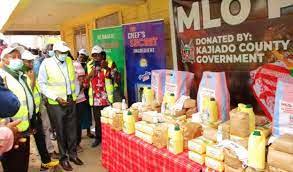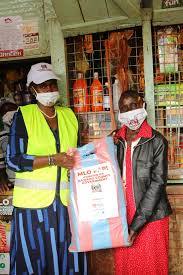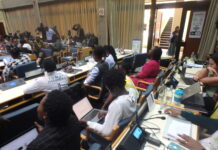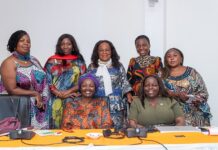By Lilian Museka
Nairobi, Kenya: Lorna Sempele, an award-winning author and firebrand in her field, has excelled again to introduce a remarkable Kenyan ICT invention that enables thousands of people to access free food in a few days, with no crowding and public display of philanthropy.
Sempele, the CEO of Empiris Creative Communication Ltd has invented, with the help of software engineer Joshua Nderi Wanjugu, the CEO of Fashionnaire Corporation Ltd, a system dubbed M-Riziki, that integrates a mobile application, a virtual PIN created using a back-end algorithm, and e-commerce, which makes it possible for vulnerable people to receive an SMS containing a secret PIN, and which gives them free access to a hamper of food from the shop closest to them. The shop is pre-selected by a financier, and the payment automated directly to the shop via Mpesa.

This innovation comes at an opportune time when Kenya continues to see Covid- 19 steadily increasing by the day. The country has so far recorded a total of 4,738 confirmed cases and recorded 123 deaths as of June 21st having tested 59,958 people.
During the Sunday briefing marking 100 days since the first case was reported, Cabinet Secretary for health Mutahi Kagwe admitted that the country was in the midst of a crisis that had badly weakened the economy, cost jobs, and impacted on businesses, particularly on informal sectors. Currently, 40 out of 47 counties have recorded cases of infection.
The pandemic has resulted in thousands of Kenyans and millions around the world experiencing hunger and lack of basic needs. Thanks to the lockdowns and social distancing, many people have been left without an income
Several counties have closed their open-air markets which are a crucial link in accessing food. This has worsened the locals’ situation of providing food to their families. Children who depended on school feeding programs no longer have access since the closure of schools. Families are now relying on relief food and cash transfer programs for survival. This has created an opportunity for many well-wishers to venture into innovative ways of assisting communities.
Says Lorna Sempele, “the innovation has already been used in Kiambu County first, with the support of Senior Chief Stephen Muturi, where we tested the system and served a number of beneficiaries, as a prototype before patenting the innovation. Kajiado County then became the second county to benefit from a Right-of-Use contract to help feed over 2000 people in Kajiado North.”
Use of the M-Riziki system in Kajiado County was launched by the County boss Joseph ole Lenku who embraced the use of the innovation, to help distribute food items to over 30,000 residents. The food hamper includes maize flour, cereals, salad oil, porridge flour, face masks, and sanitizers.
“The method of buying food from large monopolies in the city, and then driving to vulnerable groups in rural areas, and dumping the food to large crowds is indignifying and can cause harm through stampedes as happened in Kibra recently. There’s no privacy. But with M-Riziki, a beneficiary receives the message privately and goes at their own convenience to get free food or any free product. There is seamless support from any financier to a vulnerable” says Lorna Sempele.
“Three months ago, I had seen a group of donors giving out papers to beneficiaries and had to escort them to preselected shops to witness the purchase and pay the shopkeepers via Mpesa. “This is a very public, not dignified, and not efficient method. I started thinking of a different way we could reach large numbers of people without crowds especially during this Covid-19 era. I reached out to Fashionnaire LTD, an IT firm and we developed the M-Riziki,” she adds.
The system enables them to feed the people without them being on the ground. “We have started in Kiambu, then Kajiado, and we hope to move to other counties, she adds. The system virtually links beneficiaries to the support and manage the money for donors to pay goods sold through local outlets. It can also help distribute ARVs, special needs equipment while supporting local vendors. This method, therefore, enables an economic stimulus of local businesses, when so many have closed due to the economic recession and the COVID pandemic when many have reduced disposable income.
Most people in rural areas re already experiencing difficulties in keeping social distance and can neither afford masks. The effects of Covid-19 have taken a toll on them as even putting food on the table has become a problem.
Lenku singled out most areas affected in the county to be Mailua (Kajiado Central), Torosei (Kajido west) and Ikilunyeti (Kajiado East).















